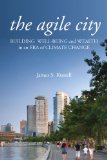The Agile City
The Agile City by James S. Russell is an easy to read, pro-city book. Feeling much like a Richard Florida book at points, the author highlights examples of cities getting things right in regard to building wealth and dealing with the effects (and causes) of climate change. It is neither a book about green washing, nor is it filled with pie-in-the-sky “green” plans for how to remake the way we live. The book focuses on practical objectives to build wealth and well-being through cities.
Released in late spring, the book is quite current and takes on the challenges currently faced as a result of the mortgage meltdown. It’s also a more insightful read today because the author draws from so many new examples including developments currently in progress across the world from the Pacific Northwest to Germany.
Throughout the book, Russell, the Bloomberg News architecture columnist, finds concrete examples of the way buildings are reducing their energy costs and impacts on the environment, as well as providing a better quality of life for their users. It’s refreshing that nearly all of his ideas are based in real world examples. He also doesn’t frequently push for large scale solutions, instead focusing on a number of the ideas that are small and incremental.
Perhaps of interest to Milwaukeeans (and frequently left out of similar books), The Agile City has a section on the costs of deploying a water system to different types of infrastructure. Russell breaks down how water isn’t priced to match the costs of getting the water to the various locations, and is instead billed equally to all customers, pointing out that greenfield hookups can easily cost up to 10 times as much as ones in established suburbs. He also warns of a not-to-distant future where there isn’t enough water in the fast-growing cities of the western United States.
If you’re not extremely well versed in all things “green” or LEED-certified, but are interested in cities or the environment, you will enjoy and get a lot out of The Agile City. At times it reads a bit too much like a standard fare “u-rah-rah cities” book, but the recency, worldwide focus, and pragmatic environmental focus make it worth your time.
I give it, 4 out of 5 stars.























Comments